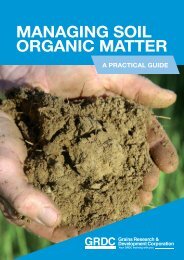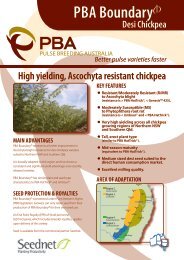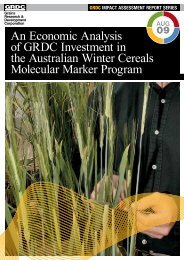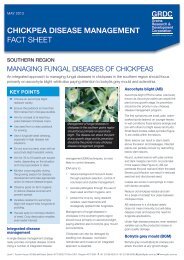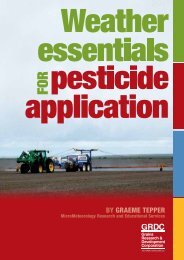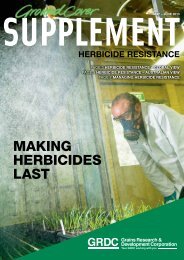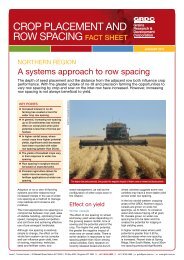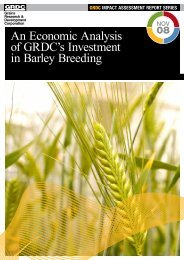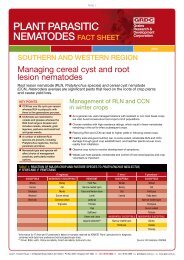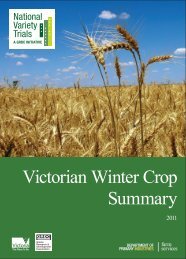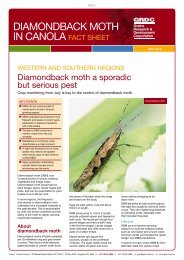An Economic Analysis of GRDC Investment in Minor Use Chemicals
An Economic Analysis of GRDC Investment in Minor Use Chemicals
An Economic Analysis of GRDC Investment in Minor Use Chemicals
You also want an ePaper? Increase the reach of your titles
YUMPU automatically turns print PDFs into web optimized ePapers that Google loves.
The Without Scenario<br />
The key assumption shap<strong>in</strong>g what is a hypothetical scenario is a restrictive one <strong>of</strong> no<br />
<strong>in</strong>vestment by <strong>GRDC</strong> <strong>in</strong> the MUP from 1998 to 2010. (Recall the logic is that an<br />
evaluation can only be done by compar<strong>in</strong>g the outcome with an <strong>in</strong>vestment aga<strong>in</strong>st<br />
the outcome <strong>in</strong> the absence <strong>of</strong> the <strong>in</strong>vestment). Therefore the <strong>in</strong>dustries that did<br />
benefit from the MUP would, at least <strong>in</strong>itially simply have cont<strong>in</strong>ued on the trajectory<br />
they were on <strong>in</strong> 1998. The Without Scenario will therefore need to def<strong>in</strong>e a<br />
trajectory over the period from 1998 to 2010 tak<strong>in</strong>g <strong>in</strong>to account trends and drivers<br />
<strong>in</strong> the <strong>in</strong>dustry operat<strong>in</strong>g environment over that period <strong>in</strong>clud<strong>in</strong>g community<br />
pressures.<br />
The follow<strong>in</strong>g clarifies the basis for estimat<strong>in</strong>g benefits. The Without Scenario <strong>in</strong> this<br />
section is def<strong>in</strong>ed <strong>in</strong> relation to the actual. There will be discussion for example <strong>of</strong><br />
<strong>in</strong>creased disease losses <strong>in</strong> relation to actual losses <strong>in</strong>curred. However when benefits<br />
are def<strong>in</strong>ed, losses will be reversed <strong>in</strong> sign and discussed <strong>in</strong> terms <strong>of</strong> losses avoided<br />
as the benefit.<br />
The project proposal (<strong>GRDC</strong> 1998) for the first MUP, JAY1, def<strong>in</strong>es relevant aspects<br />
<strong>of</strong> the base-l<strong>in</strong>e situation <strong>in</strong> 1998. Pulse Australia had been funded by <strong>GRDC</strong> <strong>in</strong> 1996<br />
to review ‘<strong>of</strong>f-label’ use <strong>of</strong> pesticides <strong>in</strong> the pulse <strong>in</strong>dustry. The pulse <strong>in</strong>dustry was<br />
emerg<strong>in</strong>g as a major player on world markets which were <strong>in</strong>creas<strong>in</strong>gly concerned<br />
with residue levels. The review <strong>in</strong>dicated that:<br />
“farmers produc<strong>in</strong>g pulse crops did not have access to a wide range <strong>of</strong> registered<br />
pesticides, and as a consequence were forced to use unregistered pesticides if they<br />
are to ma<strong>in</strong>ta<strong>in</strong> pr<strong>of</strong>itable and susta<strong>in</strong>able production. This has implications for the<br />
quality assurance programs be<strong>in</strong>g promoted by the pulse <strong>in</strong>dustry In addition the<br />
authorities responsible for the sale <strong>of</strong> pesticides <strong>in</strong> Victoria had threatened legal<br />
action aga<strong>in</strong>st pulse growers who have used unregistered pesticides on their crops.”<br />
The Pulse Australia review raised three trends relevant to the Without Scenario:<br />
1. the <strong>in</strong>creas<strong>in</strong>g dependence on unregistered chemicals,<br />
2. the implications for QA programs, and<br />
3. the legal implications from us<strong>in</strong>g unregistered chemicals.<br />
Note unregistered chemicals <strong>in</strong>clude chemicals which may be registered for similar<br />
situations or similar crops but the <strong>in</strong>tended use is not specifically provided for on the<br />
product label. M<strong>in</strong>or use permits authorise specific <strong>of</strong>f-label uses. In the follow<strong>in</strong>g,<br />
the term “unregistered” will <strong>in</strong>clude the absence <strong>of</strong> a m<strong>in</strong>or use permit as well unless<br />
specifically mentioned otherwise.<br />
The AATSE (2002) review <strong>of</strong> pesticides noted the 40 percent <strong>in</strong>crease <strong>in</strong> pesticide<br />
<strong>in</strong>crease for all crops from 1996 to 1999, and earlier dramatic examples <strong>of</strong> residue<br />
detections on export markets. Industry and community concerns were becom<strong>in</strong>g<br />
major drivers <strong>of</strong> change <strong>in</strong> the range <strong>of</strong> regulatory measures used for pesticide<br />
control. The AATSE review <strong>of</strong> <strong>of</strong>f-label use quoted a submission observ<strong>in</strong>g that “as<strong>of</strong>-right”<br />
use as <strong>in</strong> Victoria “placed growers <strong>in</strong> Victoria <strong>in</strong> the unenviable position <strong>of</strong><br />
need<strong>in</strong>g to second guess complex matters.” On the other hand, the permits legalise<br />
what would have been illegal under the vary<strong>in</strong>g legislative requirements <strong>of</strong> the<br />
States. Also quoted was an NFF submission comment<strong>in</strong>g that on the basis that they<br />
considered that the permit system at that time had a reduced risk assessment<br />
compared with registration, therefore “the potential for environmental damage and<br />
untenable residue <strong>in</strong> produce is <strong>in</strong>creased.” Follow<strong>in</strong>g a number <strong>of</strong> studies <strong>of</strong> national<br />
pesticide issues APVMA (2003) summarised as follows:<br />
_________________________________________________________________<br />
Agtrans Research Page 24




